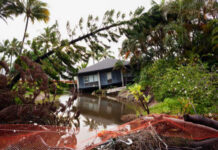
(NationalFreedomPress.com) – Two young children died in a Texas driveway while their mother slept inside, and the official story unravels with every new discovery, forcing a community and a nation to confront the uncomfortable truths about hot car deaths, parental responsibility, and systems that fail to protect the most vulnerable.
Story Snapshot
- A Texas mother, Tiona Lasaisha Islar, was arrested after her children, ages 3 and 6, were found dead in a hot car outside their home.
- Authorities discovered inconsistencies in Islar’s account, prompting a deeper investigation and a search for neighborhood surveillance footage.
- The case brings renewed attention to the persistent and preventable crisis of hot car deaths in Texas and nationwide.
- Community outrage and demands for accountability are mounting as the official cause of death remains pending.
The Day Two Children Did Not Survive the Heat, And the Questions That Followed
September 20, 2025, began like any late-summer Saturday in Far West Bexar County, Texas, until it ended in tragedy. Tiona Lasaisha Islar told authorities she last saw her children, Sevani Stevenson and Miyani Islar, inside their home at 10 a.m. before she went to sleep. She awoke hours later to a nightmare: her two children, just three and six years old, unresponsive in the family car parked steps from their front door. Deputies arrived to find both children dead, their mother’s account riddled with gaps and contradictions. The Bexar County Sheriff’s Office, already wary from prior CPS involvement, immediately launched a full-scale investigation, their suspicions heightened by the day’s sweltering heat and the mother’s shifting story.
Every detail of that afternoon is under scrutiny. Deputies and EMS tried desperately to revive the children, but it was too late. By 3:30 p.m., two young lives were lost, and Islar was in handcuffs facing charges of Injury to a Child SBI/Death. The official cause of death is still pending, but few doubt the role of the Texas heat, a silent killer that claims dozens of young lives each year. Sheriff Javier Salazar made a public plea for neighborhood surveillance footage, determined to piece together the missing hours and hold those responsible to account.
Patterns of Tragedy and the Systems That Struggle to Intervene
Hot car deaths are not a new phenomenon, but each case reignites public debate about parental vigilance and systemic shortcomings. Since 1990, more than 1,150 children have died in hot cars across the United States, with Texas leading the nation in these preventable tragedies. The state’s relentless climate, coupled with moments of distraction or neglect, creates a perfect storm for disaster. In the Islar case, the backdrop of previous Child Protective Services involvement raises red flags about deeper patterns of risk and missed intervention opportunities. The community, reeling from the deaths, is now asking: how could this happen again, and what will change to prevent it from recurring?
The Bexar County Sheriff’s Office, along with CPS and the Medical Examiner, is combing through evidence and prior case files. Every agency involved faces public scrutiny, not just for the events of that Saturday, but for the larger questions their handling of the case provokes. Why, after prior warnings and history with the family, were Sevani and Miyani still at risk? And will the results of the autopsy finally provide clarity, or only deepen the wounds of a family and community in mourning?
Why Texas Remains Ground Zero for Hot Car Deaths
Texas’s status as a hot car death epicenter is rooted in more than just geography. The state’s lengthy, brutal summers combine with high rates of car ownership and, often, a lack of accessible childcare or emergency support. Advocacy groups like Kids and Car Safety have long warned that technology, such as rear-seat reminder systems, and public awareness campaigns can reduce these deaths, but progress is slow and inconsistent. In the Islar case, experts point to the rapid rise in car interiors, often exceeding 130°F within an hour, and how quickly children succumb to heatstroke. Experts like Jan Null, who tracks these fatalities, stress that even attentive parents can make fatal mistakes, but recurring cases with prior CPS involvement suggest a more complex mix of risk factors, sometimes involving neglect or systemic failure.
Public outrage is growing, especially among those who see this tragedy as an avoidable outcome of both individual choices and institutional lapses. The debate over criminal accountability versus systemic reform is far from settled, and the outcome of the Islar investigation will shape future policies and public attitudes toward child safety in Texas and beyond.
What Comes Next: Grief, Accountability, and the Unfinished Story
The Islar case is far from over. As the autopsy results are awaited and the legal process unfolds, the local community grieves and demands answers. The Bexar County Sheriff’s Office continues to seek evidence, and CPS faces renewed scrutiny over its prior involvement with the family. State lawmakers and advocacy groups are already calling for new reviews of hot car safety technologies and stricter oversight of at-risk households. The deaths of Sevani and Miyani have become a rallying point for those determined to prevent another tragedy, and a harsh reminder that vigilance, accountability, and systemic reform must go hand in hand.
For now, the questions outnumber the answers, but one fact is clear: what happened in that Texas driveway should never happen again. Whether this case leads to meaningful change or fades into another grim statistic depends on what comes next, from the courtroom to the legislature, from public memory to personal responsibility.
Copyright 2025, nationalfreedompress.com
























